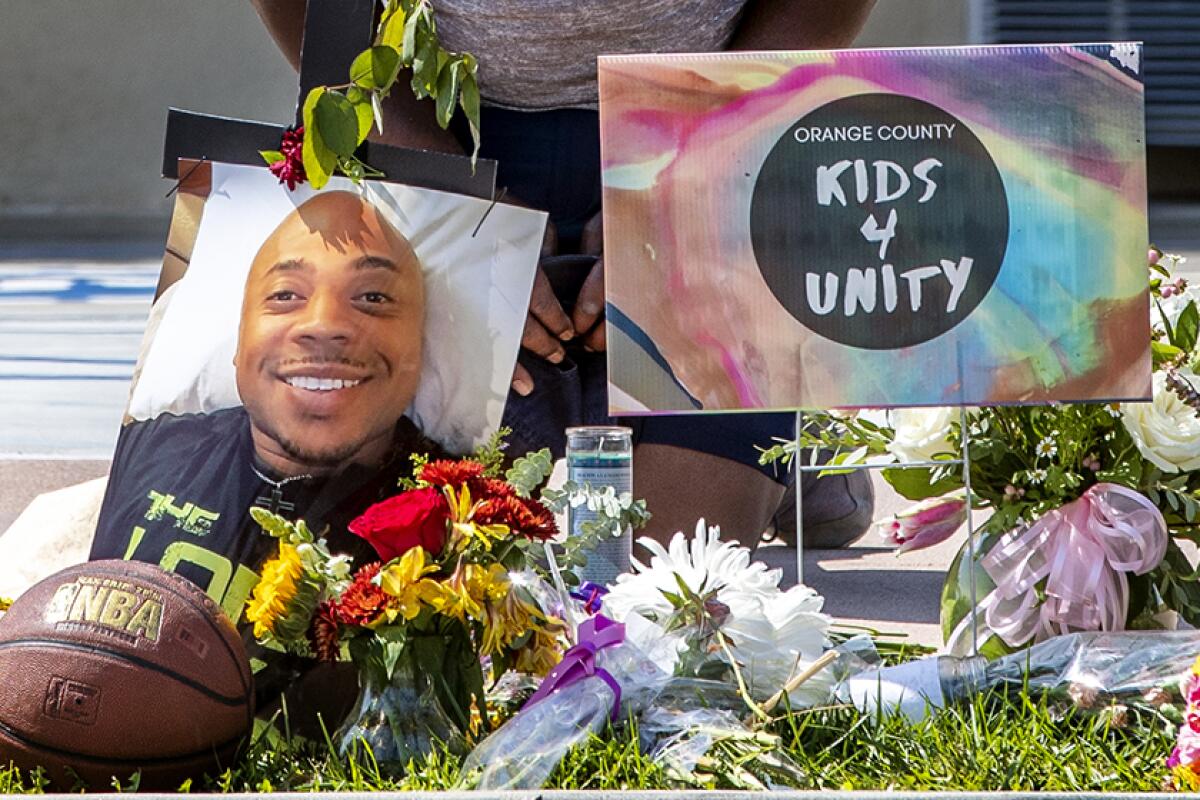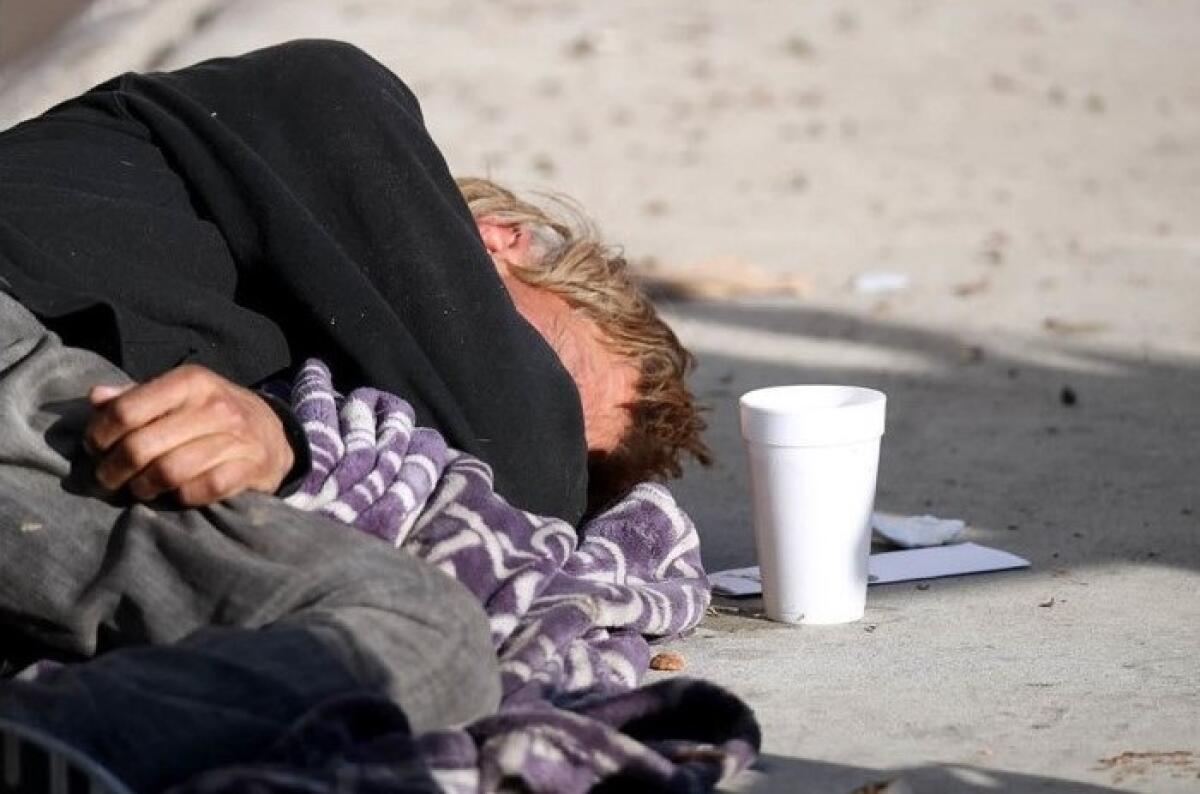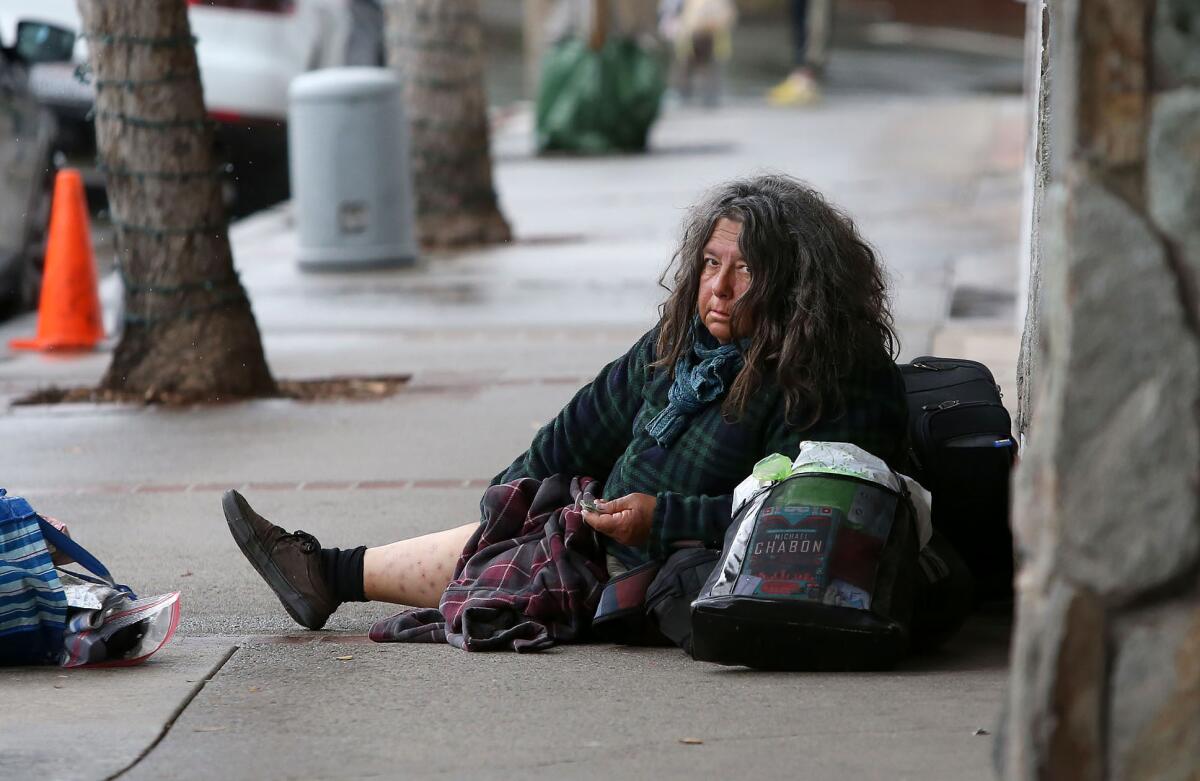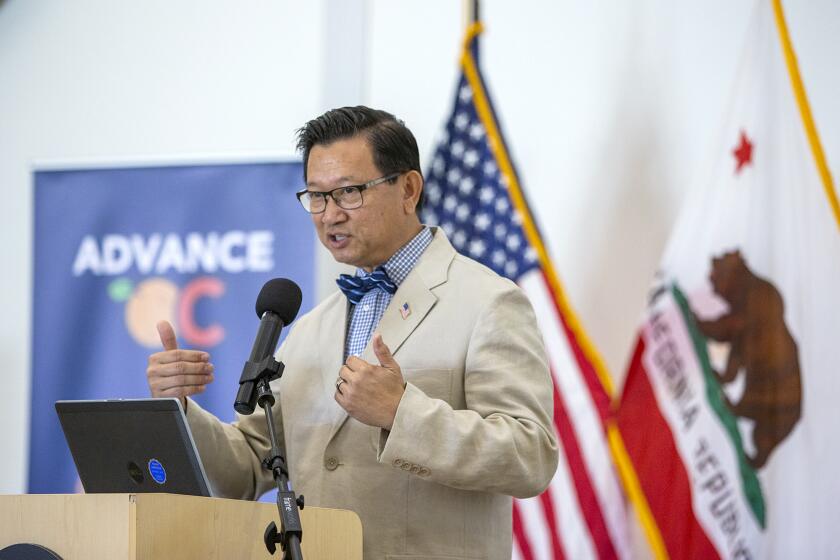To free up police and reduce violent conflicts, O.C. cities reassess police response to mental health calls

- Share via
In an effort to free up police and decrease violent confrontations between law enforcement and people with mental health issues, several Orange County cities are aiming to use teams of medical workers to respond to mental health-related calls for service.
Many have criticized police responses to mental health calls because officers may lack the expertise to deescalate tense situations. Often, the sight of a law enforcement officer can aggravate a person suffering with mental health issues. This hit close to home last year when Kurt Reinhold, a homeless Black man with mental health issues, was shot and killed during a confrontation with Orange County sheriff’s deputies in San Clemente. The incident provoked outrage similar to the highly publicized Fullerton police killing of Kelly Thomas, a schizophrenic man who was beaten to death a decade ago.
“Kurt is not the first homeless individual who has been killed in Orange County by law enforcement,” said Brooke Weitzman, an Orange County-based attorney who represents the homeless. “There are a handful of really public ones — I think it first got public with Kelly Thomas, but it happens every year or so, sometimes twice a year.”
Orange County isn’t alone contending with the issue. Since the killing of George Floyd more than a year ago, many have called for police to refrain from engaging in mental health calls. Los Angeles has been working on using trained specialists to respond to calls instead of law enforcement.
Cities are pursuing these teams in a few different ways. Fullerton and Buena Park are partnering together in an effort known as Project HOPE, which is expected to start next month.
Another method being considered by some cities is the use of mobile response teams provided by Be Well OC, which provides mental health support to county residents. It runs the first mental health and wellness campus in Orange County.
Huntington Beach and Garden Grove have chosen to partner with Be Well OC to implement the response teams. Several other Orange County cities are considering the teams.
“The idea is to free up police officers,” said Tony Delgado, the director of the response teams. “For a long time they’ve had responsibility to respond to every call that comes from 911, many of them not requiring police presence.”
Delgado said limiting the chances of violent confrontations is a “byproduct” of the team.
“Sometimes police presence can escalate those situations, in others they are needed,” Delgado said.
On Tuesday, the Irvine City Council voted unanimously to spend the next year exploring the program and figuring out how best to integrate it into the city’s current health response system. City staff was also directed to explore funding for the program.
“I applaud all the efforts of IPD and all the work that you do, but many of you know how I feel about jailing and policing our way through what is essentially a public health crisis,” Irvine Vice Mayor Tammy Kim said at the council meeting. “I think this is a great step, and I love this partnership.”

The Be Well OC mobile response teams are based on a nationally recognized CAHOOTS mobile-crisis intervention program created in 1989 in Oregon. The model is now used by cities around the country, including Oakland, Portland and Denver, among others.
The Be Well OC teams, which are comprised of mental health workers and medical personnel, will be dispatched to calls for service in a way similar to police or firefighters. However, the team will only respond to non-emergency calls related to mental health, addiction and homelessness.
Police dispatchers will screen calls to ensure that they meet safety criteria before they are handed off to a crisis team. Irvine Police Lt. Dave Klug said during a presentation at the council meeting that the team will respond to calls that fall into four categories — mental illness, substance abuse, homelessness and family support issues, which includes requests for counseling assistance for teens.
Crisis team members will wear regular attire and drive non-police vans, which may encourage a more positive response from the person struggling with mental health issues.
An Irvine city staff report says that the team “reduces [the] likelihood of escalation, violence and resulting use of force that can occur when a police officer is present.”
Weitzman expressed concern that the mobile response teams may work too closely with police. Delgado said that dispatchers will have the power to decide whether police should be present at a scene, including whether an officer should accompany the response team at a scene.
“It’s all about safety of the people we’re responding to, safety of the teams,” Delgado said. “So we certainly want to make sure that everybody is safe first and most of all.”
Delgado said that mobile response teams will provide referrals to homeless shelters when possible. Be Well OC is also working toward providing response team members the ability to connect homeless people with housing.
Law enforcement has also acknowledged the need for mental health professionals in responding to calls.
“Arguably, the most important benefit of this model is that it is simply better at supporting members of our community suffering from mental illness,” Klug said. “The professionals hailing these calls have extensive training and professional experience, supporting those in crisis and their families. They know the resources that are available and are best equipped to help those in crisis. This should lead to better outcomes.”

As referenced by Delgado, police departments also see this as a way to be more efficient, allowing their officers to focus on other public safety issues that they are trained for.
“A significant benefit of this model is that it relieves our officers from handling non-police-related calls, so they can focus their time on things like proactive policing, crime prevention community outreach and being available for emergency calls for service,” Klug said.
The Irvine Police Department responds to about 2,400 calls a year that involve people suffering from mental health issues. The department also anticipates responding to more than 2,000 calls this year that involve homeless people. According to a city staff report, officers will spend more than 11,000 hours responding to mental health- and homeless-related calls this year.
“As a result, our police officers are spending a significant amount of time solving problems and dealing with challenges when others may be better equipped to successfully resolve them,” Klug said.
Weitzman said the mobile response teams could be a step in the right direction, but she is skeptical of the new program.
“Obviously, these healthcare workers responding is better than having armed police officers responding,” Weitzman said. “It’s not going to compound trauma, it’s more likely to lead to social workers engaging for social services. It’s more likely to have response folks who are adequately trained to deal with both mental health crisis and substance abuse disorder and basic social needs, like employment. But, it’s not going to magically create housing or shelter.
”... If the expectation is less people dying in the street, well, having a different response team isn’t going to create new solutions. If the expectation is less wasted police money and better outcomes, I’m hopeful that it will do that, it’s kind of yet to be seen.”
Support our coverage by becoming a digital subscriber.
All the latest on Orange County from Orange County.
Get our free TimesOC newsletter.
You may occasionally receive promotional content from the Daily Pilot.




